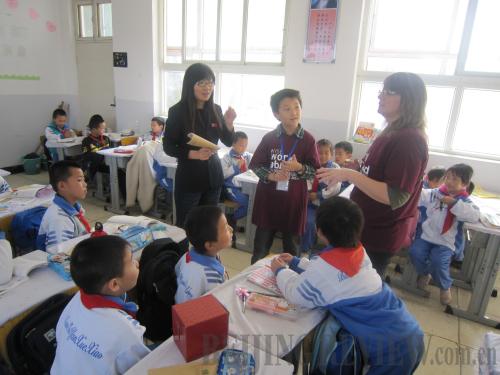|
 |
|
A HELPFUL INTERPRETER: As the youngest volunteer, Liu Tianchen feels glad and proud to work as an interpreter for a Peruvian in the World Youth and Student Travel Conference 2010 Volunteer Project on October 16, 2010 (LIU JIAN) |
Learning for Fun
by Chen Jianyang
Young as he is, Liu Tianchen, my nine-year-old son, has studied English for seven years. He can speak with foreigners in colloquial American English. For him, learning English is a lot of fun.
In an age of globalization, more and more parents are realizing that foreign languages are an important means of communication.
Kids from ages two to six excel in memorizing and can easily pick up listening and speaking abilities. In this golden period of brain development, learning a foreign language also helps develop their intelligence. Therefore, Chinese kids, especially those living in cities, start learning foreign languages at an early age. My son started learning English when he was two years old.
When my son turned six, we began to invite some young American tutors to teach him three hours every week at home. Unlike the formal teaching at a language training school, they didn't have any textbooks or fixed teaching styles. They talked about a variety of topics, listened to English songs, or watched talk shows. The tutors have also taught him historical, social and cultural background of British and American societies, and explained to him the meaning of English idioms and jokes, which have broadened his horizons and enriched his knowledge of Western culture.
As for cost, perhaps some parents may ask whether it's worth the money to have foreign tutors. My answer is yes. I pay 400 yuan ($ 60.3) per week for the three-hour instruction, and annually it cost me 20,000 yuan ($3016.6) in total. The cost is more or less the same as tuition at a good language training program, yet my son has one-on-one instruction. It's Chinese tradition to pay high attention to education. I believe my investment will bring far more than the money I paid.
Last year, Nathan Keyes, a Princeton University student, stayed at our home. My son often chatted with Nathan about a variety of topics, from world geography and American presidents, to American universities and music appreciation. On Sundays, they went to church, sang with the choir and studied the Bible. Now he always has an appreciative attitude toward things and people.
As he can speak English very well, we often encourage him to participate in various international activities. In October, he took part in the World Youth and Student Travel Conference 2010 Volunteer Project at Beijing Bainian School, a school for the children of migrant workers. Some 30 international volunteers paired to teach a 40-minute English class. As the youngest volunteer, he felt glad and proud to work as an interpreter for a Peruvian volunteer.
Compared to his peers, he has two languages to access information and knowledge with, which equips him with more knowledge and a broader vision. Reaping the benefits of learning English, he feels that learning a language opens a door to a country. His next goal is Spanish. |